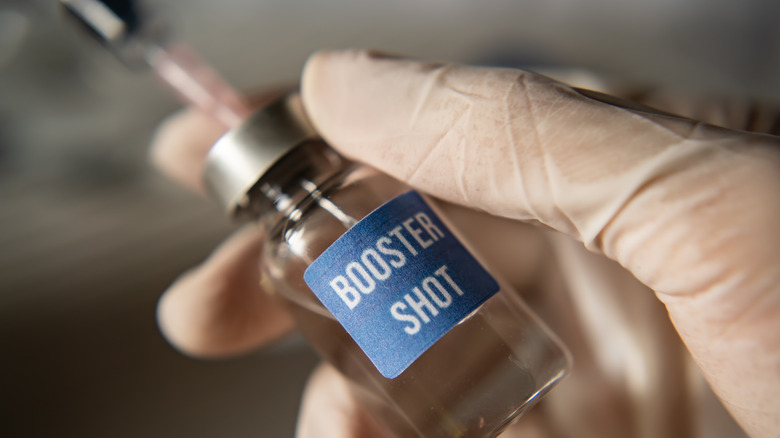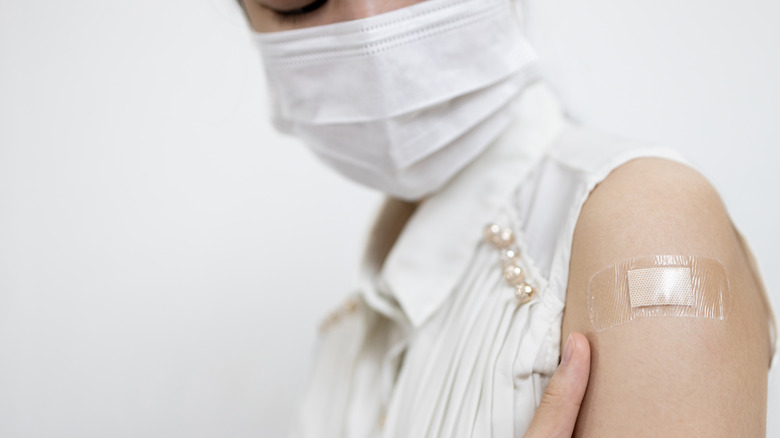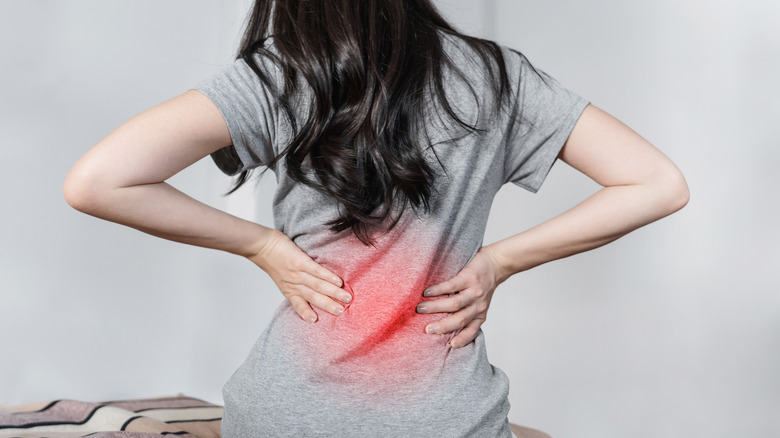Side Effects Of Pfizer's COVID-19 Booster Shot Explained
Booster shots to help protect against COVID-19 are now available for millions of people. This is a third dose of the vaccine to boost your immune system to fight off the COVID-19 illness caused by the virus. According to the Centers for Disease Control (CDC), you're available for a Pfizer booster shot if you're over 65, an adult who has an underlying medical condition, living in a long-term care setting, or living or working in a high-risk environment. You also need to have had your first two doses six months ago.
The CDC allows you to mix and match your booster shots, so if you had your first two doses of the Pfizer COVID-19 vaccination, you could get your booster shot with the Moderna or Johnson & Johnson. You may want to stick with Pfizer for all three shots, and you can do that too. It comes down to personal preference.
In the clinical trial data Pfizer-BioNTech submitted to the Food and Drug Administration (FDA), recipients of the Pfizer booster shot reported similar side effects to a mild flu-like illness. Here are some of the side effects you can expect from your Pfizer COVID-19 booster shot.
Injection site pain
Injection site pain is the most common side effect reported in the clinical trials from Pfizer for the COVID-19 booster shot. A little more than 83% of the people who received the Pfizer's booster shot said they experienced pain at the injection site. You may also experience some redness and swelling at the injection site. Those who had injection site pain experienced it for an average of 2.6 days, and redness and swelling averaged 2.2 days in duration. However, it can last for one to eight days (via FDA).
The CDC states two ways you can reduce injection site pain and swelling. First, apply a cool washcloth over your arm where you received the shot. Wet a clean washcloth with cool water and ring so the cloth is damp. Then, hold on to the injection site. The second way to reduce injection site pain and swelling are by exercising your arm. You can take ibuprofen, aspirin, acetaminophen, or an antihistamine if you're experiencing pain or swelling from your shot, as long as you have no medical reason to avoid these medications. Check with your doctor if you're unsure. Also, call your doctor if pain and redness at the injection site gets worse after 24 hours.
Fatigue
Fatigue is another common side effect of the Pfizer booster shot, with 63.7% of recipients reporting it from the clinical trial (via FDA). Fatigue is feeling excessively sleepy or tired and is another common side effect of the first two doses of the COVID-19 vaccine. Fatigue is the second most common side effect being reported. Tiredness should go away a few days after receiving the booster shot. In the meantime, there are some ways you can combat fatigue.
Bustle says feeling fatigue after your shot likely means your immune system is working, but it can be bothersome. The best way to deal with post-vaccine tiredness is some self-care. Listen to your body and respect that it may need more rest for a few days. Allow yourself to sleep when you can or rest more. Avoid alcohol or strenuous activity. Give yourself a few days without these things, so you're not even more tired. Drink plenty of water to stay hydrated, which can help with fatigue.
Headache
In the clinical trial, a little more than 48% of the Pfizer COVID-19 vaccine booster recipients reported getting a headache (via FDA). You can take ibuprofen, aspirin, or acetaminophen if you get this side effect from your booster shot, unless you have a medical reason not to. If you're unsure, ask your doctor if you can take one of these over-the-counter pain killers (via the CDC).
Fortunately, a headache from your booster shot should go away, and there are some other ways to relieve a headache. A 2016 study showed that alcohol can trigger headaches, so avoid or limit alcohol before and after your booster shot. A 2013 study showed holding a cold compress or ice pack on your head can help by constricting blood vessels and decreasing inflammation. Finally, enjoy a cup of coffee or tea. The caffeine in these drinks can improve your mood and constrict blood vessels, helping with headache pain (via a 2017 study).
Muscle pain
Muscle and joint pain is a common side effect of Pfizer's COVID-19 booster shot. More than 32% of participants 56 and older reported muscle pain, and 21.5% reported joint pain. Those ages 16 through 55 also experienced muscle pain, with 45.5% reporting it and 27.5% having joint pain (via FDA).
The CDC recommends staying hydrated, dressing lightly, and resting if you're experiencing a fever, which can come with muscle pain. Also, dress in layers so you can remove an outer layer if you start to feel hot. You can take over-the-counter pain killers to help with this side effect.
ProFysio Physical Therapy recommends resting when experiencing muscle pain. Take a break from exercising for the first couple of days after getting your booster shot. You may need a longer break if you're still experiencing muscle pain after the first two days. Give your body time to rest and recover.
Chills
You might find yourself wrapped in a warm blanket after your booster shot. A side effect of Pfizer's COVID-19 booster shot is the chills, something you may also experience from the flu or cold. A little over 41% of participants ages 16 through 55 experienced chills, and 24.8% of participants aged 56 and older reported getting chills (via FDA).
Healthgrades recommends keeping a sweater on hand so you can warm up if you start to get the chills. You can also take a hot shower or warm bath to help with feeling chilly. Chills should go away in one or two days, so you won't have to deal with it too long.
Wrap yourself up in a warm blanket and take a nap to warm up, and allow your body time to upgrade its immune system. Contact your doctor if any of your booster vaccine side effects worry you.






